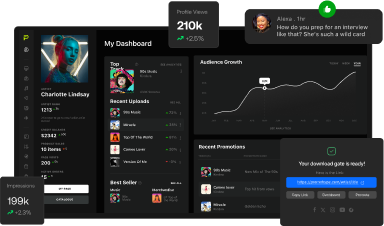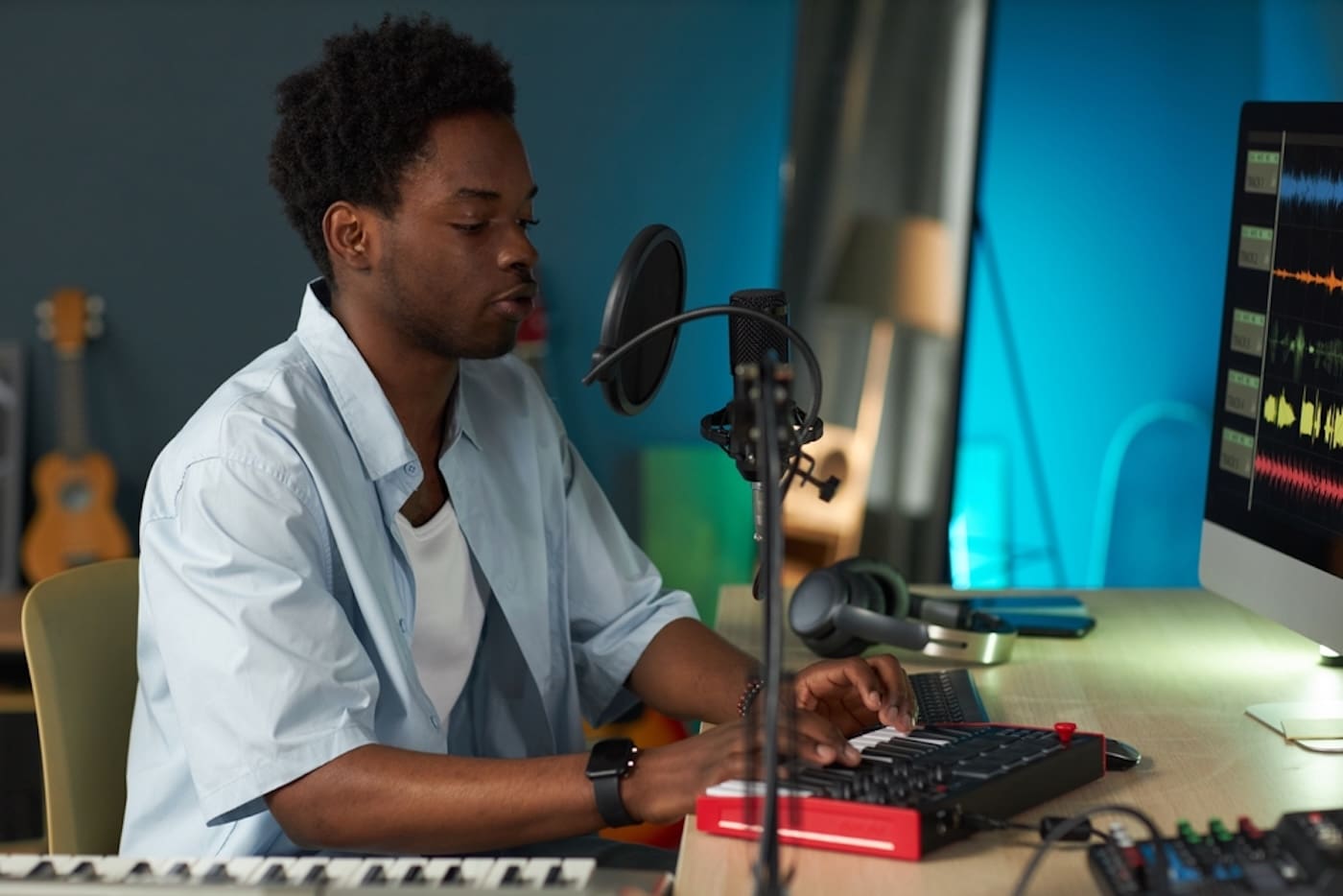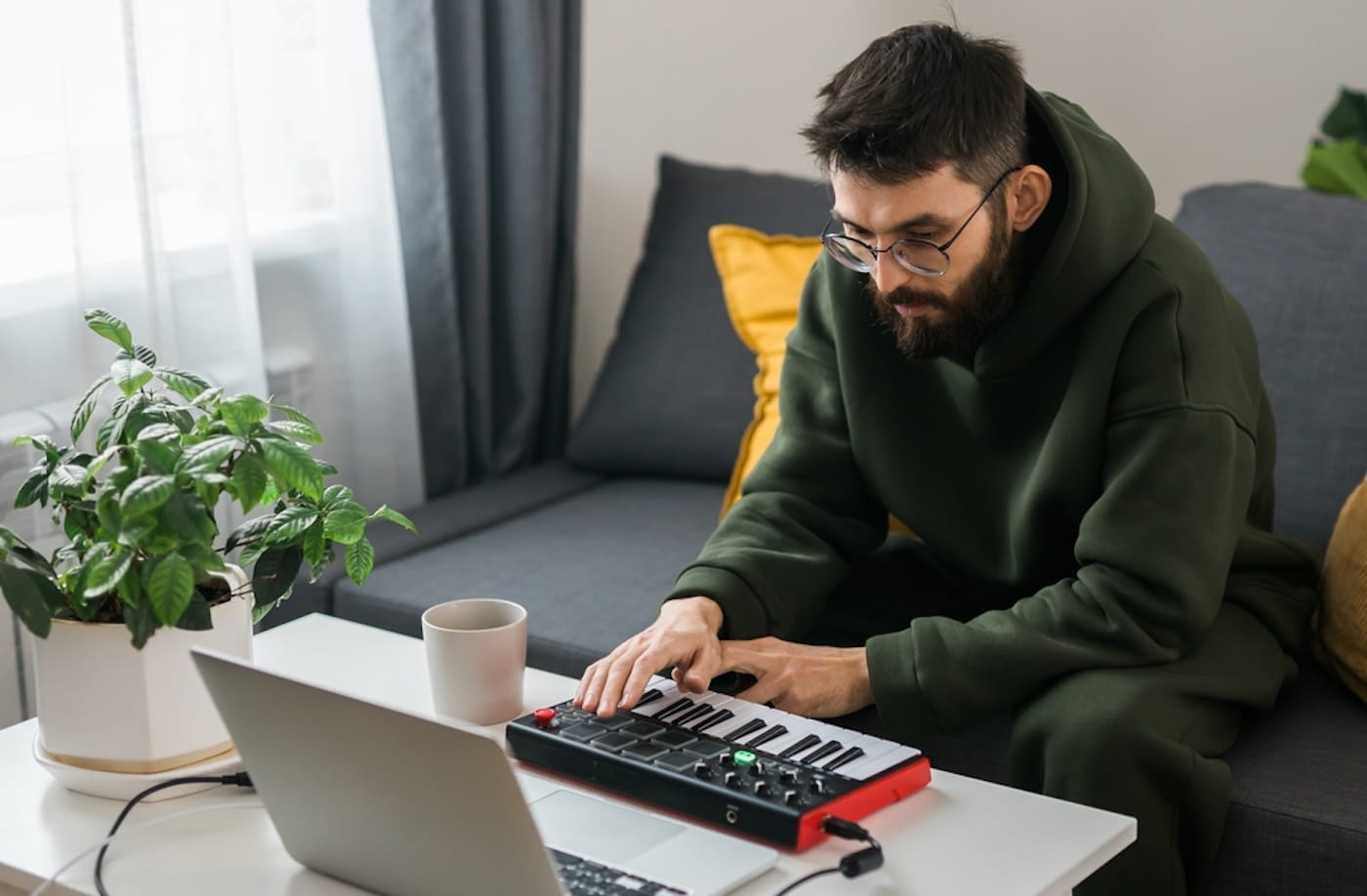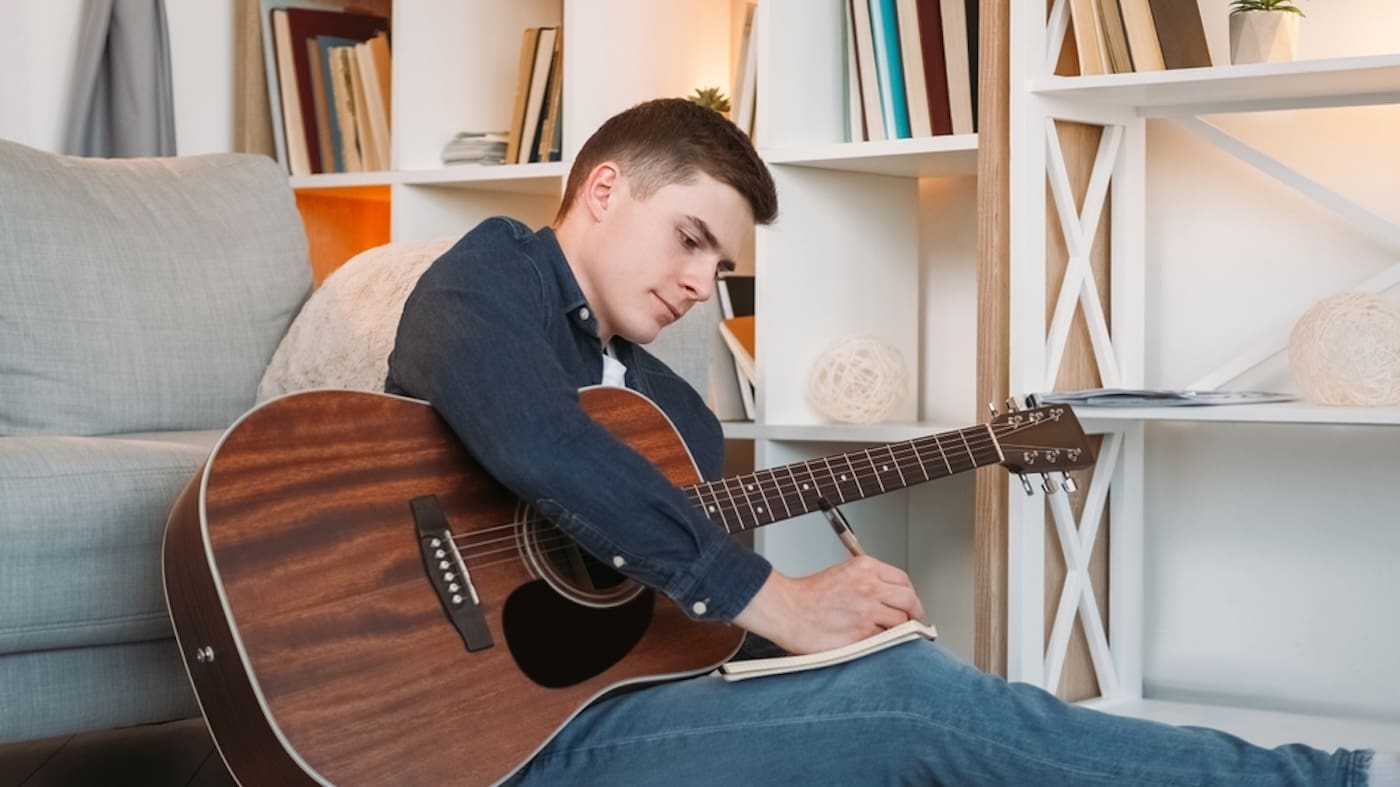
Whether developing an arts education or providing financial assistance to small ensembles, music grants are vital resources for musicians from all walks of life.
With many organizations offering grants, applicants need to know what is required of them to access funding.
This guide breaks down the best music grants you can apply for today, covering the application process and funding level range.
Get Early Access
To Promo Hype
What Are Music Grants?
Music grants are forms of funding opportunities for musicians, singer-songwriters, producers, and other music industry creatives.
They are designed to help musicians learn, perform, and make music, launching new projects and recording and producing material.
While some organizations that provide music grants don’t place restrictions on how the funds are used, others stipulate clear conditions.
They also have unique requirements for eligible applicants when requesting financial assistance, making them highly sought-after.
Different music grants are available for amateur music creators and professional musicians, with varying levels of financial support.
Who Is Eligible For Music Grants?
Eligibility for one of the many music grants in the United States or elsewhere will vary based on a range of factors.
This includes the individual function of a given grant, the type of funding opportunities you’re looking for, and the geographical location.
Specific eligibility criteria can also be applied based on the stage you’re at in your music career and any track record of success
In general, however, you may be eligible for one of the many music grants available to up-and-coming artists if you’re a:
Songwriter Or Composer
If you’ve mastered how to write a song and are looking for additional funding, you may be eligible for several grants.
Demonstrating your track record and supplementing this with additional information on collaborations will increase your odds of success.
Music Producer
Funding is also available for music producers who can demonstrate creative and professional development.
These funds can be used to upgrade your studio gear, cover the costs of session musicians, and other requirements.
Independent Musicians
With the rise of the independent music sector, an increasing number of grants are available to assist with career development.
These initiatives are typically aimed at fostering the grassroots sector, providing up-and-coming solo acts and bands with opportunities to develop.
Related read: The ultimate guide to music royalties.
The 10 Best Music Grants In The US
Independent musicians and songwriters have an impressive selection of grants available to help foster their careers.
Here’s our selection of the 10 best music grants for launching projects and finding professional support and communities.
10. Salt Lick Incubator
Funding level: $5,000 – $15,000
A popular resource for grants is the nonprofit organization Salt Lick Incubator, which awards funds to contemporary genre musicians.
Money can be used to master various processes taught at the best music production schools, as well as marketing and branding.
Recipients of grants can access direct support and mentorship from industry professionals to streamline their creative efforts.
It’s a song-driven grant that requires a feasible project proposal, but with up to $15,000 available, the effort is worthwhile.
9. Dolly Parton Songwriters Award (BMI Foundation)
Funding level: $20,000
The BMI institute in the United States is perhaps best known for managing performance royalties for independent musicians and artists.
They also offer the Dolly Parton Songwriters Award, helping emerging artists gain funding for studying music and buying instruments.
There’s up to $20,000 up for grabs, with genres like blues, Americana, and contemporary Christian popular among applicants.
With Dolly Parton once again returning to number one in the charts, it’s a grant with considerable pedigree behind it.
8. Tennessee Arts Commission
Funding level: $1,000 – $25,000
The Tennessee Arts Commission was established to assist artists across a range of skill sets, from visual arts to music.
Independent musicians and composers can apply for performance-based or composition-based grants according to their needs.
You don’t have to have matching funding to apply, and the average amount per recipient is an impressive $5,000.
Eligibility requirements include demonstrating income from work, with this income being a significant source for their livelihood.
Also read: The 10 best music distribution services.
7. Reel Change: The Fund for Diversity in Film Scoring
Funding level: $20,000 average
Some music funding is oriented toward supporting diversity initiatives, such as the Reel Change Fund for women in film scoring.
This allows film composers to mix music and cover studio costs and other fees for orchestrating and recording music.
Since its inception, Reel Change has provided money to over 30 grantees, with brands like Steinberg and Native Instruments providing services.
Applicants are reviewed by a dedicated board of experts and leading film music composers to assess their viability for funding.
6. AmplifyWorld Artist Fund
Funding level: $1,000 – $50,000
Initially launched in 2024, the AmplifyWorld Artist Fund has helped many artists develop their careers and access resources.
Designed to empower new artists to create a sustainable income stream, the fund can be used for production and promotion.
You can also use it to learn more about music theory for producers, engage with music communities, and fund tours.
The institution also enables independent artists to connect with music industry professionals and build reputable networks.
Get Early Access
To Promo Hype
5. New York Foundation For The Arts
Funding level: $8,000 – $20,000
With an extensive history of supporting artists, the New York Foundation for the Arts helps with all stages of careers.
While some grants are used for specific projects, these can be used in a broader capacity to support an artistic vision.
Grants available through the New York Foundation for the Arts vary, from funding for music producers to general grants for other arts.
As such, it pays to check back in to see what new grants are available over time, then apply for one that matches your needs.
4. ASCAP Foundation
Funding level: $3,000 – $5,000
Like the New York Foundation for the Arts, the ASCAP Foundation awards a variety of grants for songwriters and composers.
There are awards for emerging songwriters to help master song structure, arrangements, and music promotion.
Additional services from ASCAP also extend to scholarships to help students with fees at a range of high-profile schools.
The institution has a considerable pedigree, with the acclaimed composer and lyricist Stephen Schwartz hosting ASCAP events.
With an extensive roster of workshops and seminars also available, the ASCAP Foundation is one of the most comprehensive organizations.
3. Musicians Foundation
Funding level: $500 – $3,000
Professional musicians can access funds directly through the Musicians Foundation based on specific eligibility criteria.
You need to verify your income from performance, composition, and arrangements to access the available funds.
Applications are reviewed by a dedicated committee, which may request additional documentation before processing the request.
If you’ve become a music producer with a proven track record, it’s well worth considering applying here for funding.
2. Foundation For Contemporary Arts
Funding level: $500 – $45,000
With close to $29 million in grants already approved, the Foundation for Contemporary Arts is a hugely popular resource for funding.
They support a range of artists and collectives working not only in music, but also in dance, theater, and visual arts.
Funds can be applied to all popular music genres, with additional emergency grants also available for closing projects.
They can be as high as $45,000, making it a solid choice for seeking funding for bands and other musical collectives.
Recommended read: The best online music production courses.
1. National Endowment for the Arts
Funding level: $10,000 – $100,000
One of the most prestigious institutions in the United States, the National Endowment for the Arts, offers a multitude of grants and support.
Many successful independent artists have used this funding to launch projects, acquire equipment, and connect with industry professionals.
While funding levels vary, they can reach high sums, particularly for subgranting programs through local arts agencies.
With total funds approaching $368 million nationwide, it has a proven track record of helping independent artists succeed.
How To Choose The Best Music Grant
With various grants available to artists, it’s important to approach choosing the best one with a clear view of what they offer.
Let’s break down the factors you need to consider when choosing a grant:
- Career stage: Different grants apply to different stages of music careers, with some for newer artists and others for professional musicians. If you’ve reached the stage of trademarking your band name and performing regularly, this will influence your choice of grants.
- Project requirements: A detailed breakdown of your project’s requirements will enable you to identify grants with optimal funding and support. Outline your expectations for studio time, mixing and mastering costs, and other project requirements.
- Current location: Some grants are restricted in terms of location, only awarding funds to musicians and producers in a specific city or state. You can refine your search accordingly and complete application forms based on your current location.
You can also request additional information from grant providers if you’re unclear on exactly what the money can be used for.
How To Apply For Music Grants
Applying for a music grant requires following a series of steps to ensure the application process runs smoothly.
If you’re considering seeking funding, here’s how you can streamline the application process:
- Take the time to research your options: Before compiling your documentation for an application, you should be clear about what options you have. Dedicating time to research will ensure your efforts are directed where positive results are most likely.
- Verify requirements for eligible applicants: Different grants require different criteria for eligibility, so reading through these requirements is a must. Age, location, career status, and other factors are often needed, depending on a specific grant.
- Gather the relevant documentation and evidence: When applying for grants, various documents are expected to be provided with the application. This can include letters of support from educators, samples of your musical work, and a budget spreadsheet.
- Learn from feedback and rejections: Acquiring grants is highly competitive, with thousands of musicians seeking funding for their careers. If your application gets rejected, ask for more information and evaluate your strategy moving forward.
By securing grants, you can increase your chances of making money as a music producer or singer-songwriter.
Read this next: How to build a home recording studio.
The Best Music Grants Available Outside of America
We’ve covered a selection of grants available for musicians, producers, and songwriters in the United States.
For those working outside the US, these grants offer opportunities for funding and support through their programs:
- PRS Foundation: This UK-based funding organization offers a range of initiatives and access to money for producers and creators in the country. They benefit various career levels, from early-stage artists to international opportunities.
- Music Capital Scheme: If you’re an artist based in Ireland, this scheme comes with full support from the Department of Culture, Communications, and Sport. Over 200 groups have used the Music Capital Scheme to access funding for instrument purchases and other requirements.
- Creative Australia: Another government-backed resource for artists, Creative Australia’s grants apply to a range of musical skills. This includes record label development schemes and programs dedicated to contemporary music.
- Factor: The Foundation Assisting Canadian Talent on Recordings has various programs for musicians who meet its eligibility standards. In addition to artists, managers, record label owners, and other industry roles can also apply for funding.
- NZ On Air: The New Zealand government’s funding platform, NZ On Air, supports new artists when money is needed for producing music and promoting audio and video content.
Make sure you verify the application requirements before you apply to ensure that it matches their guidelines.
Summary
Producing music and building a career is a costly venture, making music grants valuable resources for independent artists.
By applying for grants from the institutions covered in this article, you can finance your latest projects and develop your career.
You can also consider researching local opportunities for support in your city or state, including initiatives and available funding.
Get Early Access
To Promo Hype
Join Promo Hype






